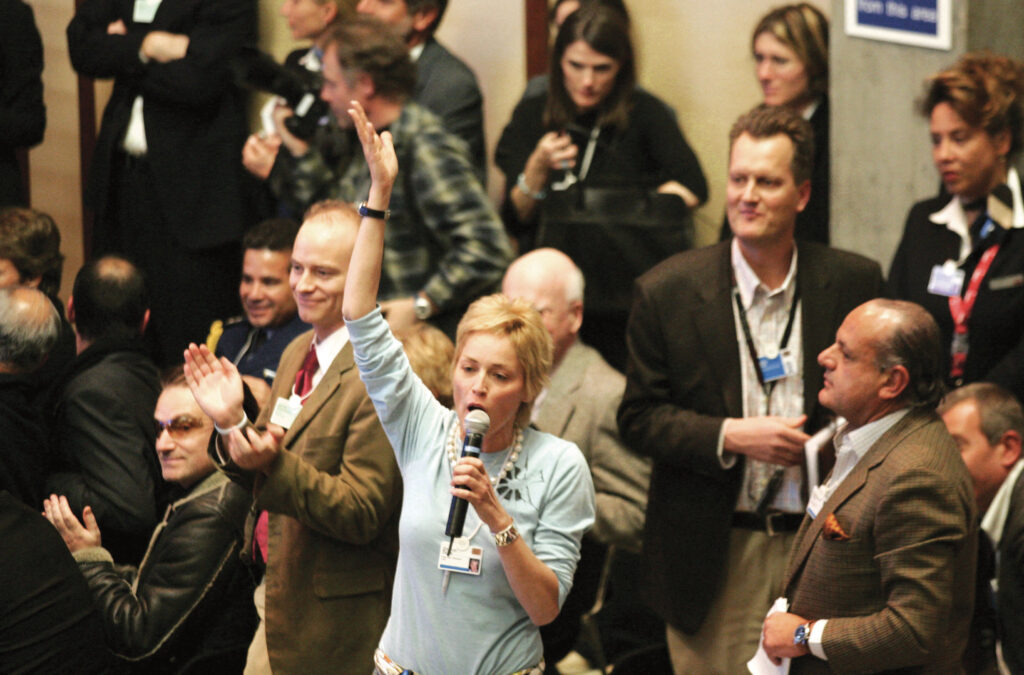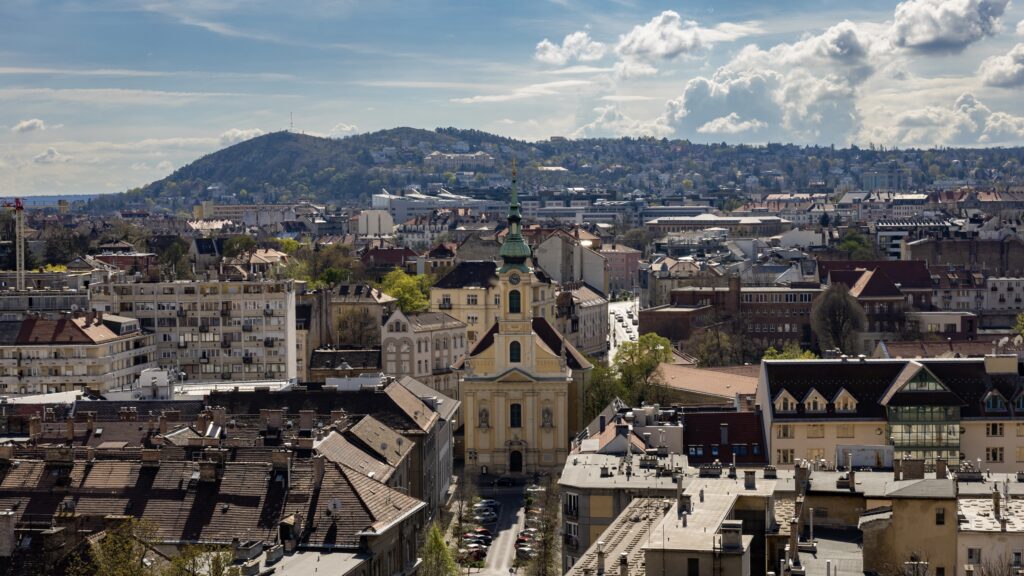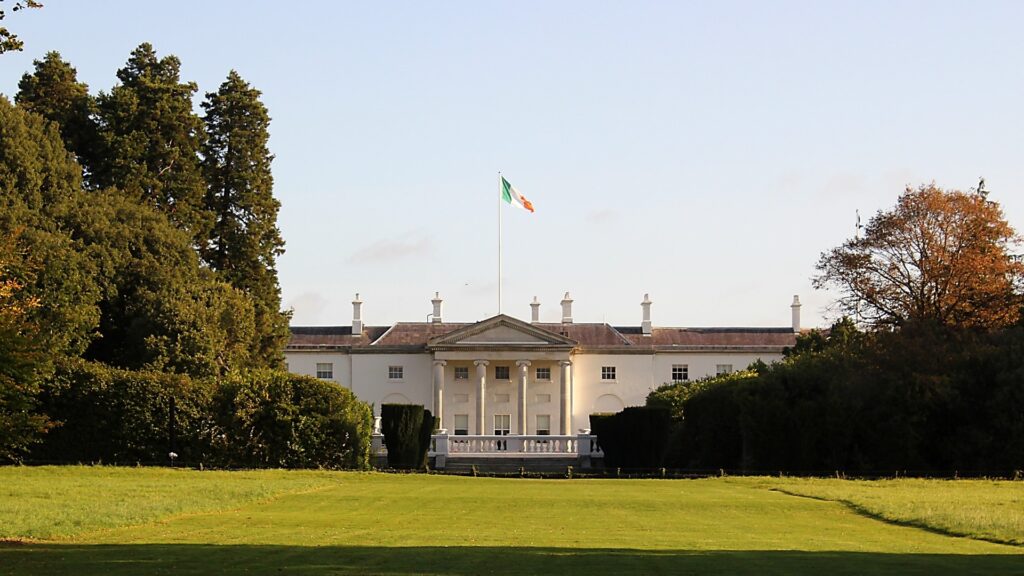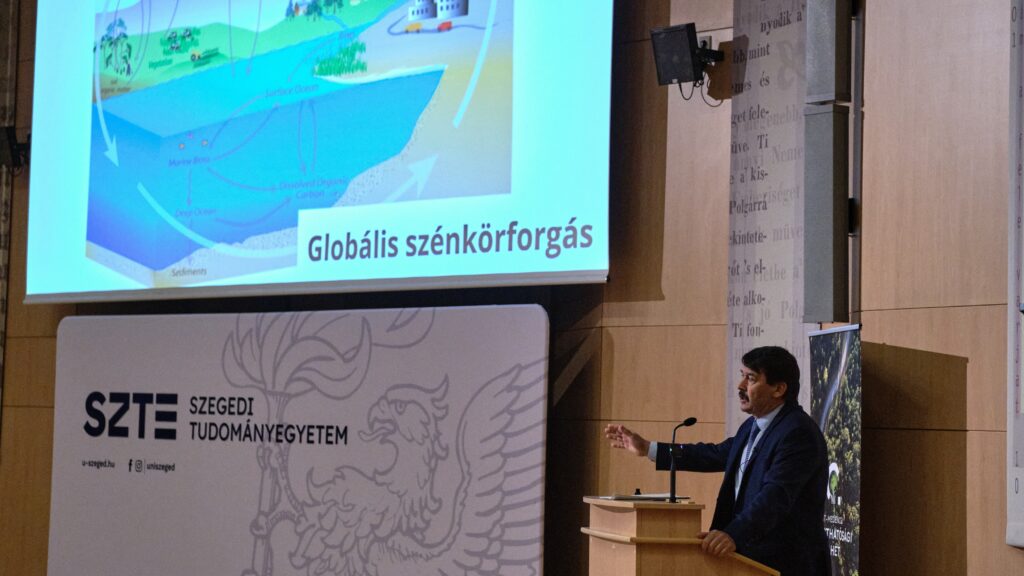This article was originally published in Vol. 4 No. 3 of our print edition.
Helping to Create a Fairer Social Market Economy and the Global Fight against Climate Change Concerning Domestic Companies
A Different Kind of Capitalism
The market economy has been functioning for thousands of years, and it is difficult to surpass the equilibrium established by the law of supply and demand. The aim of economic activity is profit, and ideally, through the interaction of roughly equal-sized and equally informed participants, the market creates the desirable balance. However, the technological explosion has led to investors in innovation hubs gaining access to more and more information, and consequently, more capital, disrupting this balance. The extreme disparities are causing increasing social tensions, necessitating alternative solutions. Therefore, we formulate our present study as a kind of conversation starter.
We aim to draft a manifesto that sheds light on an alternative kind of capitalism—primarily beneficial for domestic business circles—which we refer to as ‘inclusive capitalism’. It is important to emphasize that our goal is not solely to outline inclusive capitalism but to formulate what we term ‘capitalism alternatives’. We seek to provide a comprehensive, nuanced view of this concept, offering guidance for affluent and proactive organizations and individuals, while also navigating through the maze in which some influential figures, under the misconception of unlimited growth, have veered off from the common goal to pursue profit maximization, thereby disregarding the responsibility they hold in shaping the world economy.
In addition, we intend to introduce some specific new tools to help revitalize capitalism. It is our collective hope that these alternatives could be applicable in the domestic business and social spheres. We believe that in the coming years, during the UN’s Decade of Action1 by rethinking and reassessing the relationship between humans and the planet, we can contribute to the healing of our common home, the Earth, and to the sustainability transition not just with lofty words and theories, but with active action by rethinking economic activities. (‘Flow’ for People and Planet.)
On the following pages, you will encounter words and phrases that may challenge the reader’s existing belief in the paradigm of continuous growth, which may have shaped their current life and worldview. We, the authors, hope that this study will initiate profound changes in the reader (e.g. business owners), first within themselves, and then in the world of which we are all creators and components.
Saying Something New About Capitalism?
‘Is there anything new left to say about anything? Is it worth comprehensively reviewing the current state of affairs and the world today? Are we not already inundated with too much data and too many explanations as it is?’2 These and other questions are posed by Tibor Görföl, theologian, university professor, and editor-in-chief of the journal Vigília, which is available on the website of Magyar Kurír. We do not reference these questions in our study without reason. The above quote can be found in the Hungarian summary of Pope Francis’s encyclical ‘Fratelli Tutti’ or ‘All Brothers’.3
This is the encyclical where the Pope once again raises his voice against the injustices, greed, inequalities, and narrow-mindedness prevalent in the world. This is the encyclical that urges greater solidarity in the world, calling for more fraternal love for comprehensive human development and the common good, in accordance with the principles of the Gospel. This is the encyclical that, in reality, would not have seen the light of day if the world had taken more seriously what Pope Francis wrote in his 2015 encyclical ‘Laudato si’’ and acted in its spirit.
So when the question arises as to whether anything new can still be said, unfortunately, the answer is ‘yes’. But not because it is necessary to approach a topic from a different perspective just for the sake of understanding a concept. Nor because progress across time requires new and different insights. Rather, it is because the world today either ignores or refuses to acknowledge what has already been said or written, or has simply forgotten, and needs to be reminded once again.
The above statements—in our view—are particularly true in the case of capitalism. When we examine the concept of capitalism, we can see that it is a social and economic system ‘whose most important factors are capital, entrepreneurship, and consumption, with the direct aim of individual gain…In capitalism, capital and the means of production are in private ownership, the organization of labor, production of goods, and distribution of income occur within private enterprises, according to economic principles. Its principle is the pursuit of self-interest, free competition, which is considered paramount above all other human manifestations.’4
Therefore, we can see that it could be considered a modern and adequate concept from the perspective of twenty-first-century economic and social well-being, as we experience its values and positive opportunities, but we must also be mindful of its dangers (e.g. the pursuit of profit for its own sake, disregard for human dignity and the common good, and abuse of power). Next, let us examine one branch of capitalism and the thoughts of the man whose name it bears, Milton Friedman.

Overcoming the Friedman Doctrine
Milton Friedman (1912–2006) was an American economist with Hungarian ancestry. He was awarded the Nobel Prize in 1976 for his contributions to consumption analysis and monetary history and theory, and for demonstrating the complexity of stabilization policy. He is associated with the so-called laissez-faire doctrine of capitalism,5 of which he was not only a supporter, but also one of its greatest proponents. This view holds that economic matters of society should be entrusted to individual decisions, excluding collective exercise of power.6
‘The narrow realm of the extremely wealthy continues to distance itself from the world of the average person and particularly from that of the poor’
According to this philosophy, the social goals of a company or corporation can only be achieved by focusing all its resources, including its human resources, on maximizing its own profit, excluding the collective exercise of power. The spirit of the Friedman Doctrine promised that by maximizing profits, the wealth generated by the economic corporation or organization would be redirected for the benefit of society, including the poorest. However, this promise has yet to be fulfilled, and we can confidently predict that it never will be. In fact, far from reducing social inequalities, it has put the underprivileged at a disadvantage compared to the capitalists.
Those companies and individuals who believed in and promoted the Friedman Doctrine worldwide ultimately failed to live up to their promises. Nevertheless, this doctrine has been predominant in the United States and, with a few exceptions, worldwide for over five decades.
As Joseph Stiglitz points out: ‘The free-market ideologue and Nobel Prize-winning economist Milton Friedman not only influenced the spread of shareholder primacy doctrine but also ensured that this doctrine became part of American labour laws. He went so far as to say: “companies have only one social responsibility. And that is to use their resources and engage in activities to increase their own profits”. The irony is that shortly after Friedman made these thoughts public, they began to be popularized and incorporated into laws regulating corporations—as if this were a carefully considered economic theory.’7
In our view, the Friedman Doctrine had failed by the early twenty-first century, and going beyond his ideas has become essential. By calling on corporations to at all costs maximize shareholder value—meaning profits and stock prices—regardless of the consequences for employees, consumers, suppliers, and local communities, they have created a level of societal inequality and harm to the natural environment that is no longer sustainable: it is unjust and runs counter to its original purpose.
This Economy Kills
Marc Benioff, CEO of Salesforce, says ‘Capitalism, as we know it, is dead. We will see a new kind of capitalism—and it will not be Milton Friedman’s capitalism, which is all about making money. In the new capitalism, the essence of businesses will be to serve not only their shareholders but also their stakeholders: employees, customers, public schools, the homeless, and last but not least, the planet itself.’8 This thought is only new in the secularized world, considering that the leaders of the Catholic Church have been mentioning the necessity of harmonizing economy and ethics for a long time. Pope Leo XIII gave voice to these thoughts as early as 1891, in his encyclical ‘Rerum Novarum’: ‘The exposition of the subject is difficult and not without danger. It is a tough task to balance the rights and duties that regulate the relationship between the rich and the poor, the capitalists and the workers. Our venture is perilous because troublemakers and deceitful people can easily exploit it to distort the right position and incite the masses.’9
The Pope recognized that the processes in the economy are unjust, giving rise to almost immoderate inequality, and it is our conviction that—continual rhetoric to the contrary notwithstanding—maintaining inequality serves only the interests of the wealthy. In a later chapter of our study, this will be further contextualized, but for reference, we cite another section from ‘Rerum Novarum’: ‘Of course, no one is obliged to give from what satisfies his own or his family’s needs, nor even from what is needed for a decent and socially appropriate standard of living, “because no one is obliged to live in an unfitting manner” (II-II, 32, 6). However, if we have already provided for our needs and the standard of living appropriate to our social position, it is our duty to give to the needy from our surplus.’10
Forty years after the publication of the mentioned encyclical, Pope Pius XI expressed a similar argument: To each, therefore, must be given his own share of goods, and the distribution of created goods, which, as every discerning person knows, is laboring today under the gravest evils due to the huge disparity between the few exceedingly rich and the unnumbered propertyless, must be effectively called back to and brought into conformity with the norms of the common good, that is, social justice.’11
We can see, therefore, that despite the passage of forty years, the problem has not only not been resolved, but has further deepened. Unfortunately, it remains present to this day, which is why Pope Francis draws attention to it in almost all of his papal pronouncements, from ‘Evangelii Gaudium’ to ‘Laudato si’’, all the way to ‘Fratelli Tutti’. He writes the following in ‘Evangelii Gaudium’: ‘Just as the commandment “Thou shalt not kill” sets a clear limit in order to safeguard the value of human life, today we also have to say “thou shalt not” to an economy of exclusion and inequality. Such an economy kills. How can it be that it is not a news item when an elderly homeless person dies of exposure, but it is news when the stock market loses two points? This is a case of exclusion. Can we continue to stand by when food is thrown away while people are starving? This is a case of inequality.’12
Positive Examples from the International Business World
At the time of the birth of the Friedman Doctrine, there were already companies operating in the world that embraced a spirit that transcended their time, being more modern (and, it might not be an exaggeration to say, more ethical and moral). Although they are few, there seems to be an alternative economic life, as highlighted by the aforementioned ecclesiastical leaders. A testament to this spirit is the following excerpt from the Credo of Johnson & Johnson, where the company’s thoughts are outlined as follows:
‘We must respect our fellow employees throughout the world…
We must support our employees’ health and well-being and help them fulfill their family and personal responsibilities…
We must help people be healthier by supporting better access to care and treatment worldwide.
Our ultimate responsibility is towards our shareholders. Business enterprises must achieve stable profits. When we operate according to these principles, shareholders should achieve fair returns…’13
It is evident, therefore, that profit maximization is far from the primary, inherent, and sole goal of this company. It formulates principles along which the company can move towards a future that is not only fairer but also freer and happier, thereby benefiting individuals and indirectly the world (as a biosphere) as well.
From more recent history, it is worth mentioning Unilever as an exemplary company in this regard. In 2010, it launched the Unilever Sustainable Living Plan, which demonstrated the interconnectedness of sustainability and successful business performance: ‘The world has never seen as clearly as now all the social and environmental challenges we all face. The need for action is increasingly urgent. We know we have a major role to play. The brands and employees of our company have a clear mission: to make sustainable living commonplace. Over the past decade, the world has changed. All the problems that prompted us to act have become increasingly widespread. For shareholders, commitment to sustainability is no longer just a desirable aspect; it is seen as a corporate guideline.’14
Similarly, the food manufacturing company Danone is a member of the B Corp Movement, which encourages companies to focus not only on profit but also on social and environmental impacts. Danone is committed to sustainable production and social responsibility. Microsoft supports numerous initiatives that promote digital education, technological access, and social equality. Additionally, the company makes significant efforts in environmental sustainability, including reducing emissions and increasing energy efficiency. IKEA is one of the best-known companies in terms of environmental protection. Their focus is on sustainable wood and energy use, as well as supporting environmental initiatives. These companies set an example of how integrating social and environmental responsibility into a business strategy is not only a good business decision but can also have positive long-term effects on society and the environment.
‘There are alternatives to profit maximization and shareholder-centric approaches’
Capitalism, as outlined earlier, has remained indebted to the majority of people. Instead of the promised prosperity for all, only very few are thriving in the world today. The narrow realm of the extremely wealthy continues to distance itself from the world of the average person and particularly from that of the poor. Prosperity does not trickle down from the top as envisioned by its architects. The current definition of capitalism is thus flawed. In the years to come, we must lay the foundations of capitalism on ground that is both old and new. One such possibility, with adequate and appropriate critical thinking, could be inclusive capitalism.
Inclusive Capitalism
Inclusive capitalism is a trend within market economies that can be seen as an international response to the unjust effects of the 2008 global financial crisis. As a result of the crisis, Lehman Brothers went bankrupt,15 but the banks were bailed out in the United States. In this increasingly challenging economic situation, inclusive capitalism came into the spotlight. The initiative, known as the ‘Rich Man’s Experiment’, originated in the United States and sought to respond to the global financial crisis before public opinion became uncontrollable and global unrest broke out.
In 2014, an international conference was held in London, attended by participants and speakers including former US President Bill Clinton; Prince Charles, the Prince of Wales; and Baroness Lynn Rothschild. The essence of the conference can be summarized in one sentence: wealthy individuals and influential global thinkers put the revitalization of capitalism on the agenda, to stabilize their own situation and the world in the uncertain aftermath of the crisis.16
Over the years, the thoughts of Pope Francis’s encyclical ‘Laudato si’’ on the ‘responsibility for caring for our common home’ have been studied, which calls for action and justice. The central idea of listening to the cry of the poor and the cry of the earth has been incorporated into the rhetoric of the resurgent global movement. Subsequently, key members of the movement, led by Lynn Rothschild, were invited for a personal visit to Rome, and under the direction of Pope Francis, the Vatican established the High-Level Council for Inclusive Capitalism in the Vatican.17
The main ideas professed by the Council include preserving human dignity, promoting justice, and healing the wounds inflicted on nature by humans. With the involvement of significant companies represented in the Vatican business council, the contribution of the entire business community in Hungary towards these goals would be a significant step. The question for the future is whether the newly established international oversight body under the leadership of Pope Francis can fulfil its function completely.
We suggest that Hungarian-owned companies feel called to action, visit, and register on the movement’s new website for collective thinking and action. There, measurable, voluntary targets should be set annually for achieving Sustainable Development Goals (SDGs) in the spirit of ‘Laudato si’’, under the supervision of the Holy Father. We see this as a guarantee that it is worthwhile for Hungarian-owned companies to engage in this collective effort by making concrete, measurable commitments. This type of leadership attitude can be aligned with the principles of so-called ‘stakeholder’ capitalism.
Stakeholder Capitalism
In a Mandiner article, András Lánczi argued that ‘In today’s capitalism, acquisition is theoretically unlimited. Therefore, there are significant economic disparities among people. Seeing this, egalitarian demands against capitalism are strengthening again. The relative scarcity continuously generates demand for mass equality—today it is triggered by vaccines, tomorrow perhaps by the relative scarcity of water.’18
Following the turn of the millennium, capitalism, which had grown to a global scale, became the world’s dominant economic force in a unique manner. In relation to this economic structure, it is important to highlight the theory that prioritizes shareholder interests, known as shareholder theory. This concept is based on the premise that the primary goal and task of a company’s activities are to maximize the returns on investments for shareholders. The leaders of companies make their decisions solely in the interest of the company’s shareholders, thus the sole aim of the corporation is profit maximization. In contrast, stakeholder theory seeks to align economic and ethical considerations by providing a foundation for harmonious growth that benefits all possible stakeholders in an economic model. This includes taking into account the interests of customers, shareholders, employees, the local community, municipalities, the state, and ultimately the Earth.
Vendel Halász expresses his views on this matter in a study discussing the characteristics of stakeholder capitalism: ‘The stakeholder approach is present in several well-functioning and long-established free market economies, so in my opinion, it does not mean the “undermining” of the capitalist economic system. Rather, it serves to ensure its sustainability. The only way to protect capitalism is through leadership that accepts social responsibility and meets the reasonable needs of the vast majority of people.’19
Stakeholder capitalism is thus a system in which a company strives to consider the needs of all stakeholders. These include customers, suppliers, employees, shareholders, and local communities alike. In this system, the goal of the corporation is long-term value creation, rather than merely profit maximization. Proponents of stakeholder capitalism believe that serving all stakeholders is essential for the long-term success of any business, as opposed to focusing solely on shareholder interests.
Its main precepts are that:
- companies must serve the interests of all stakeholders;
- emphasis should be placed on long-term value creation rather than solely increasing shareholder value;
- and prioritizing shareholders should be abolished.
‘Companies must serve the interests of all stakeholders’
Of course, like any theory, this one also needs to be approached with due criticism. These interests should always be precisely formulated, delineated, and placed in the appropriate context. We do not claim that the economy of the twenty-first century must become supranational. We, the authors, advocate that the profit-maximizing trend of capitalism is unsustainable, leading to inequality. Therefore, before it is too late, we must redirect it towards providing ‘a net for everyone who wants to catch fish’ through its social role.
An example of this is the World Economic Forum in Davos (WEF, founded in 1971), where one of the most concrete and beneficial five-minute periods occurred in 2015, when Sharon Stone raised $1 million through donations from attendees, to finance mosquito nets in Africa.20 Tom Szaky, a Hungarian-born entrepreneur and CEO of TerraCycle, announced at the Davos conference that his company’s primary goal is a simple yet profound idea: ‘the elimination of waste as a concept’. His successful business activities encompass all forms of recycling, exemplifying the principles of a circular economy. Through the Loop Service, products of major brands are delivered across multiple continents and countries using the traditional ‘milkman method’, eliminating single-use packaging altogether.21 Joining this initiative is a prominent element in the plans of the Hungarian government as well, although many details still require clarification and refinement.
Domestic Examples
The Value of Values
‘Business decisions based on solid moral values can create economic value in the long term. Often, swimming against the tide of price, we must take steps towards a fairer economic system, where respect for human dignity and the promotion of comprehensive human development are fundamental guiding principles.’ These thoughts are from János Csébfalvi, former vice president of UNIAPAC EU, in the introduction to the publication ‘The Value of Values’, which presents corporate social responsibility from a Christian perspective.
The Human-Centred Economy
The domestic pioneer of this theory is Sarolta Laura Baritz, a Dominican nun who received the Joseph Ratzinger XVI Benedict Vatican Foundation Award and the European Citizen Award. Under the name ‘Christian Social Principles in the Economy (KETEG)’, she provides university-level education at Corvinus University of Budapest and the Sapientia College of Theology. One of the instructors of this theory and an advocate for its implementation in Hungary is Tibor Héjj, the owner of Proactive Management Consulting.
The Altern-Group
The Altern Group was established in 1996 at the Department of Environmental Economics and Technology at the Budapest University of Economic Sciences (now Corvinus University of Budapest) under the initiative of Professor József Kindler, led by Tamás Kocsis, Kálmán Dabóczi, and Árpád Baranyi. The primary aim of the group is to critically examine economic theory and practice from an explicitly alternative perspective, guided by social, cultural, and moral values.
Kovász
The birth of the journal Kovász originates with the Altern Group. In 1997, following the publication of David C. Korten’s globalization-critical book When Corporations Rule the World in Hungary, they set out to cultivate its ‘afterlife’ in Hungary. Their aim was to further explore the issues raised in the book on the basis of a unified (Christian) worldview and to investigate and develop alternative socio-economic models.
Environmentally Friendly Corporate Governance Tools
The ‘workshop’ led by Sándor Kerekes, Mária Csutora, Ágnes Zsóka, and others conducts diverse theoretical activities at the Corvinus University of Budapest and elsewhere, aimed at achieving sustainability in the corporate and individual spheres. Their work primarily involves writing and editing university and corporate environmental management textbooks, conducting research, and publishing significant domestic and international scholarly literature.
The ‘Truly Responsible Company’
Gergely Tóth (Secretary General of KÖVET, university professor at the Hungarian University of Agriculture and Life Sciences, Kaposvár) presents the tools of corporate social responsibility (CSR) in his now classic book on unsustainable development. The KÖVET Association for Sustainable Economy was established in 1995 under the name Association for Environmentally Conscious Corporate Governance. They developed the ‘Truly Responsible Company’ model.
KÖVET is a non-profit organization, independent of government and interest groups. Its members are not ‘CSR or green showcase companies’, but responsible businesses that shape, implement, and promote their operations according to these principles.
The Community of Laudato Si’ Animators in Hungary (2020)
In collaboration with the Creation Care Working Group of the ‘72 Disciples Movement’, the exclusive goal of the alumni animators’ community is to promote awareness of the teachings contained in the ‘Laudato si’’ papal encyclical (by completing the online creation care course in Hungarian and English language organized by the Laudato Si’ Movement, LSM) and to encourage the establishment and operation of Laudato Si’ circles in the spirit of the encyclical, especially in the context of the tenth anniversary of ‘Laudato si’’ in 2025.
The Business Council for Sustainable Development of Hungary
The Business Council for Sustainable Development of Hungary (BCSDH) is the Hungarian chapter of the World Business Council for Sustainable Development (WBCSD), led by Attila Chikán, Jr. It primarily focuses on promoting the idea of sustainable development and proactive action within the Hungarian branches of foreign multinational corporations.
Mind Mate Inspiration (MMI)
Through the diverse commitment of professionals newly gathered around community co-founder Gábor Pintér, MMI has evolved over time into an association. One of its prominent areas of focus—alongside artificial intelligence (AI), organizational development, digital transformation, green HR, and CSR 2.0—is the use of the Sustainable Development Goals (UN SDG 17) framework to promote climate-conscious corporate models in Hungary.
Contemporary Collectors’ Academy (CCA)
As a director and brand lecturer, György Gajzágó conducts ‘Art & Business’ presentations and organizes courses in the business sector, where he focuses on incorporating the Sustainable Development Goals (SDGs) into various artistic fields. Through this, he helps keep the issue of achieving sustainability at the forefront of the art world.
At the end of this chapter, it is important to mention, at least in passing, the theory of ‘degrowth’, which has an extensive literature aimed at answering the question ‘Can we have prosperity without economic growth?’ This theory represents a radically different approach from the ones mentioned above.
In light of these considerations, we recommend that Hungarian-owned and Hungarian-interested companies orient their activities towards the sustainability turn. They should familiarize themselves with these positive examples and join existing initiatives. By doing so, they can serve as examples to start-up companies and the next generation of businesses as communities committed to transitioning to a sustainable economy.
In Place of a Summary
Instead of summarizing, we have highlighted that there are alternatives to profit maximization and shareholder-centric approaches. Therefore, it is important for Hungarian-owned companies and the corporate sector to crystallize for themselves how they intend to participate precisely in the renewal of capitalism.
In addition to our proposed alternative path, responding positively to the call of the Vatican’s Council for Inclusive Capitalism, registering and committing on their website, where members set responsible, measurable goals for themselves to achieve sustainability, let us also determine the priorities in Hungary in light of the previous documents of the National Sustainable Development Council (NFFT).22 Let this be the offering of the Hungarian business sphere for the healing and preservation of Hungary’s citizens and natural treasures. Let us cultivate the Hungarian land and preserve our health. Let us strive for the wellbeing of everyone. Let us inspire the unmotivated. Let us do all of this in the spirit of the biblical quote from the Laudato si’’ encyclical, formulated emphatically nine years ago, ‘to till and keep’, according to the spirit of the encyclical.
In this way, the Friedman Doctrine could potentially be replaced definitively by the ‘Flow’ experience, as advocated by the renowned Hungarian psychologist and Széchenyi Prize laureate Mihály Csíkszentmihályi.23 We wish, and will continue steadfastly to promote, that instead of extremely and exclusively profit-maximizing business activities, everyone can personally achieve this ‘Flow’ state in various areas of life in Hungary, at the level of the Visegrad Group, in EU countries, and around the world.
About the authors:
Ádám Gyöngy is a Laudato Si’ Animator. He has an MA in public administration from Hilbert College and a BA in international relations from the Pázmány Péter Catholic University. He is a passionate advocate of environmentalism, who currently serves as the Office Manager of the Hungarian Catholic Bishops’ Conference.
Gábor Nemes is an HR consultant, CSO, Aviation & Green HR expert, and a sustainable travel & tourism advisor. He is the sustainability officer of the Mind Mate Inspiration community.
NOTES
1 United Nations, ‘Decade of Action: Ten Years to Transform Our World’, UN Sustainable Development Goals, www.un.org/sustainabledevelopment/decade-of-action/, accessed 24 June 2024.
2 ‘Maga a valóság sóhajt fel – A Fratelli tutti kezdetű enciklika (1. rész)’ (Reality Itself Breathes a Sigh of Relief—Encyclical Beginning with Fratelli tutti [Part 1]), Magyar Kurír (7 October 2020), www.magyarkurir.hu/hirek/maga-valosag-sohajt-fel-fratelli-tutti-kezdetu-enciklika-1-resz.
3 Pope Francis, Fratelli Tutti: On Fraternity and Social Friendship (Our Sunday Visitor, 2020).
4 See the definition of ‘Capitalism’ in the Hungarian Catholic Lexicon, http://lexikon.katolikus.hu/K/kapitalizmus.html, accessed 24 June 2024.
5 The essence of a laissez-faire economy is that the government should interfere in economic activities to the smallest possible extent, leaving decisions to the market. Among classical economists, for example, Adam Smith also dealt with this idea, and many governments in the nineteenth century adhered to this view (i.e. economic decisions are determined by supply and demand in the market), making it the century of laissez-faire in much of Europe and North America.
6 For a summary of Milton Friedman’s life and work (in Hungarian), see https://mek.oszk.hu/02000/02056/html/friedman/friedman2.htm.
7 For a summary of the concept of stakeholder capitalism, see https://managementconsulted.com/stakeholder-capitalism/#:~:text=Stakeholder%20capitalism%20is%20a%20management,are%20 central%20to%20business%20planning.
8 Deborah D’Souza, ‘What Is Stakeholder Capitalism?’, Investopedia (3 October 2022), www.investopedia.com/stakeholder-capitalism-4774323.
9 Pope Leo XIII, ‘Rerum Novarum’, 1891, Vatican.va, www.vatican.va/content/leo-xiii/en/encyclicals/documents/hf_l-xiii_enc_15051891_rerum-novarum.html.
10 Pope Leo XIII, ‘Rerum Novarum’.
11 Pope Pius XI, ‘Quadragesimo Anno. On Reconstruction of the Social Order’, 15 May 1931, Vatican.va, Point 58, www.vatican.va/content/pius-xi/en/encyclicals/documents/hf_p-xi_enc_19310515_quadragesimo-anno.html.
12 Pope Francis, ‘Evangelii Gaudium. The Joy of the Gospel’, 7 Oct. 2014, Vatican.va, Point 53, www.vatican.va/content/francesco/en/apost_exhortations/documents/papa-francesco_esortazione-ap_20131124_ evangelii-gaudium.html.
13 Johnson & Johnson, ‘Company credo’, www.jnj.com/credo/, accessed 24 June 2024.
14 Unilever, ‘leading in the next era of corporate sustainability’, www.unilever.hu/planet-and-society, accessed 24 June 2024.
15 On 15 September 2008, the company filed for bankruptcy protection after most of its clients left, its stock market value plummeted, and credit rating agencies downgraded it. The collapse of Lehman Brothers was the largest bankruptcy in the history of the United States.
16 Coalition for Inclusive Capitalism, www.coalitionforinclusivecapitalism.com/, accessed 24 June 2024.
17 Council for Inclusive Capitalism, www.inclusivecapitalism.com/, accessed 24 June 2024.
18 András Lánczi, ‘Hiány’ (Lack), Mandiner (24 February 2021), https://mandiner.hu/cikk/20210224_hiany.
19 Vendel Halász, ‘A stakeholder elmélet és megjelenése az európai államok társasági jogában’, (Stakeholder Theory and Its Manifestation in the Business Law of European States), Polgári Szemle, 13/4–6 (2017), 291–306, DOI: 10.24307/psz.2017.1221.
20 ‘Members of the Austrian Green Party Demonstrate against the World Economic Forum’, YouTube (29 January 2005), www.youtube.com/watch?v=cPnqvv0aXpY.
21 Tom Szaky, ‘Eliminating the Idea of Waste’, Chicago Ideas Week, YouTube (7 March 2013), www.youtube.com/watch?v=LHqwd-LBp5c.
22 Nemzeti Fenntartható Fejlődési Tanács (National Sustainable Development Council), www.nfft.hu/, accessed 24 June 2024.
23 The flow experience is a state of mind in which people become fully immersed in what they are doing, deriving joy from it, feeling completely absorbed and focused, with everything else fading into the background, and striving to continue at any cost.








